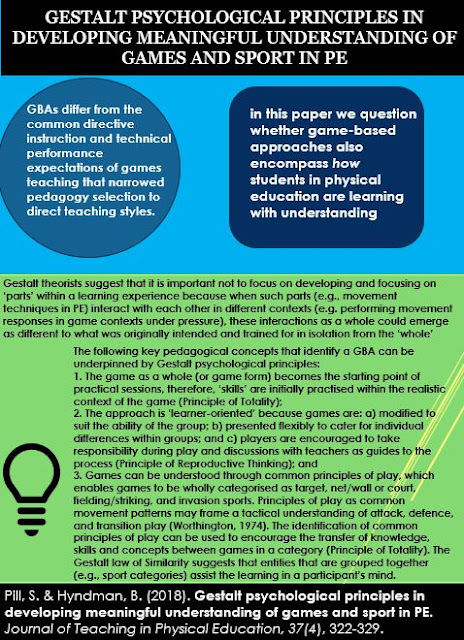Developing Meaningful Understanding of Games and Sport in Physical Education
This blog summarises ideas explained in more detail in the paper
“Gestalt Psychological Principles in Developing Meaningful Understanding of Games and Sport in PE” by Pill S, Hyndman B
Journal of Teaching in Physical Education
available here
In the sport and games focus area of PE teaching, the idea of understanding is located within the concept of games as decision-laden, problem solving contexts. However, if we add the word meaningful to understanding, that changes the idea of what understanding is in the context of games and sport.
In the game-based teaching/coaching field that I do a bit of work in, it was suggested by Bunker and Thorpe (1982) that a game-based approach in secondary physical education would be more engaging and enjoyable than "traditional" methods of teaching games and sport in PE. Engagement and enjoyment are descriptions sometimes associated with "meaningful" expereinces in PE. Game-based approaches to teaching games and sport in PE are premised on the idea of teaching "first" for understanding, and thus meaningful game participation. Thus, with respect to the cognitive and emotional dimensions of learning, a game-based approach can be looked at as potentially more meaningful for student learning than a "traditional" approach.
Could a game-based approach be a pedagogical opportunity for more than teaching games for understanding and the development of "thinking" players?
Looking at a "typical" game-based teaching episode;
The game/game form is the focus and start of the teaching episode, and therefore skills and game competencies are introduced and initially "practiced" within the realistic context of the game form. After a period of play, guided reflection on play by astute questioning by the teacher occurs. Ideally, the opening game initially captures meaning from players existing experience of past play (reproductive thinking) before new ideas are scaffolded (productive thinking). Guided questioning by the PE teacher can provide an organisational framework for effective acquisition of new ideas within the context of the "whole" (the game form) rather than as an aspect of the game initially isolated fom the play. The initial game in a game-based approach therefore serves two purposes: 1. It consolidates expected understanding by making information meaningful and familar, and 2. It prepares players for new learning challenges.
The second game episode is therefore an important consideration in progressing player learning, especially if following reflection a period of isolated practice is implemented. The second game experience is where understanding progresses as the relationship between the part practised (or discussed in the reflection QandA) takes on meaning within the game form. In the second game, the teacher is therefore looking for "performance evidence" of player "acts of cognition" to demonstrate accomplishment of understanding (Kirk, 1983).
A game-based approach therefore may make the learning of games and sport more meaningful than directive and prescriptive pedagogy, sometimes described as "demonstrate-explain-practice", but does it encourage individual meaning making? In other words, does a game-based approach convince more students than if games and sport were taught by another pedagogical orientation that games and sport participation has value for their lives "beyond the PE requirement"?
Reframing that question: Does a game-based approach enable young people to be more "physically educated" - that is, young people who have learned to arrange their lives in such a way that the physical activities they freely engage in make a distinctive contribution to their long term flourishing (MacAllister, 2013)? This would require a game-based approach in PE enabling young people, if they were not already committed participants of sport teams, to make an emotional commitment to continued involvement in games and sport beyond the PE experience. There is 30 years of research consideration of various game-based approaches, and it can be concluded that a game-based approach may enable players to better come to "know" games and sport as decision-making and problem-solving contexts, and enable students to be more developed as "thinking players", than alternative pedagogical choices for games and sport teaching - but the approach does not necessarily enable students in PE to come to a better understanding of games and sport as forms of active play contributing to one's sense of thriving over the course of one's life.
Is a game-based approach more engaging - the research suggests for most students, Yes. Is a game-based approach more enjoyable - the research suggests for most students, Yes. Does a game-based approach enable students to develop more meaningful understanding of games and sport - the research suggests probably, Yes. Does a game-based approach enable students to make meaning of the value of games and sport in the context of their lives if they are not already committed to a sport team - probably not: but I believe it could if the focus shifted from the concept of games as principles of play and the complementary relationship between tactics and technical abilities to game-based approaches contributing to what Costa and Garmston (2002) called "habits of mind". This would be a very different "spin" on what it means to develop "thinking players".
Thanks for stopping by and reading this blog. If you would like to connect with the ideas here or any of the ideas I have blogged about, you can contact via my email here



Comments
Post a Comment